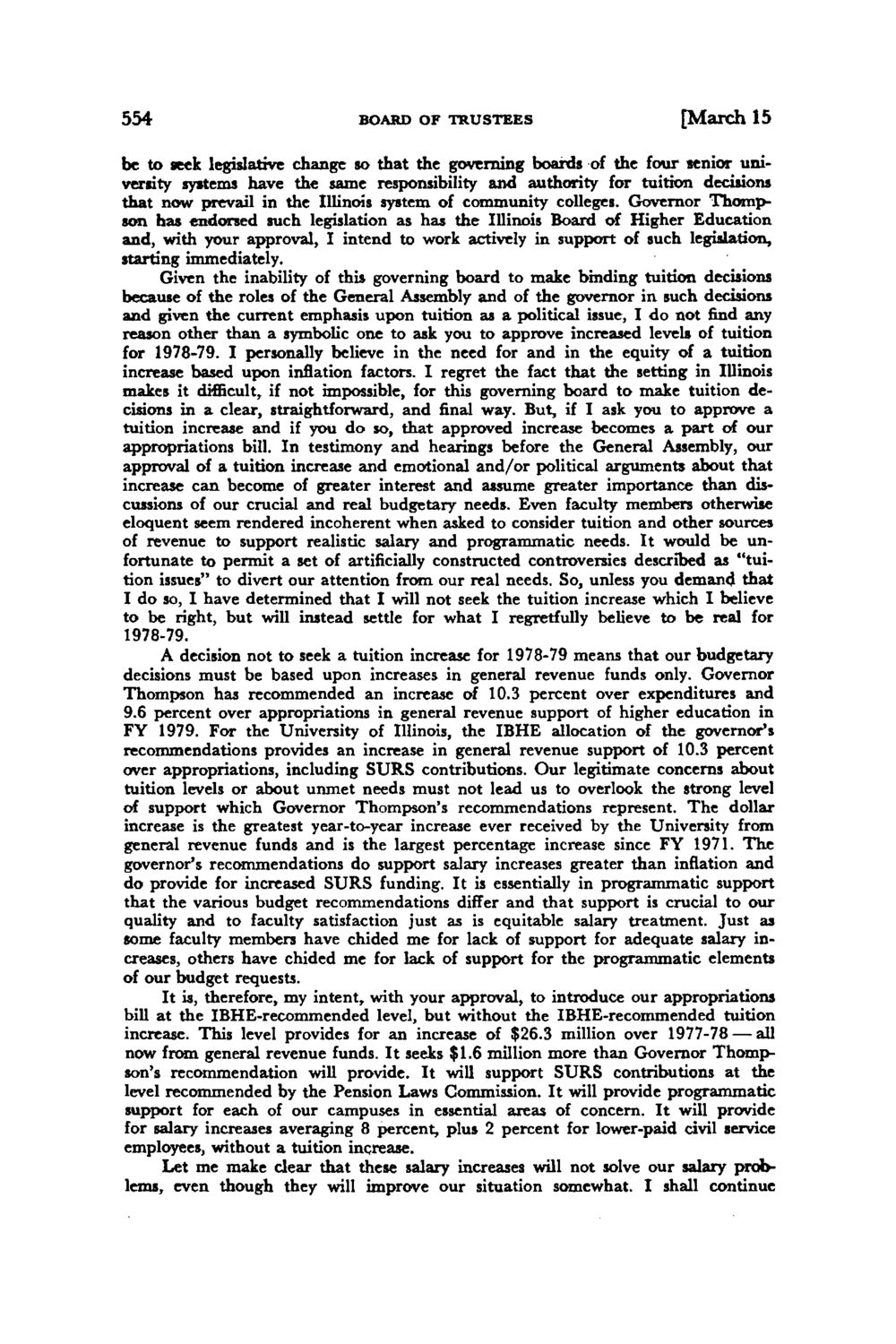| |
| |
Caption: Board of Trustees Minutes - 1978
This is a reduced-resolution page image for fast online browsing.

EXTRACTED TEXT FROM PAGE:
554 BOARD OF TRUSTEES [March 15 be to seek legislative change so that the governing boards of the four senior university systems have the same responsibility and authority for tuition decisions that now prevail in the Illinois system of community colleges. Governor Thompson has endorsed such legislation as has the Illinois Board of Higher Education and, with your approval, I intend to work actively in support of such legislation, starting immediately. Given the inability of this governing board to make binding tuition decisions because of the roles of the General Assembly and of the governor in such decisions and given the current emphasis upon tuition as a political issue, I do not find any reason other than a symbolic one to ask you to approve increased levels of tuition for 1978-79. I personally believe in the need for and in the equity of a tuition increase based upon inflation factors. I regret the fact that the setting in Illinois makes it difficult, if not impossible, for this governing board to make tuition decisions in a clear, straightforward, and final way. But, if I ask you to approve a tuition increase and if you do so, that approved increase becomes a part of our appropriations bill. In testimony and hearings before the General Assembly, our approval of a tuition increase and emotional and/or political arguments about that increase can become of greater interest and assume greater importance than discussions of our crucial and real budgetary needs. Even faculty members otherwise eloquent seem rendered incoherent when asked to consider tuition and other sources of revenue to support realistic salary and programmatic needs. It would be unfortunate to permit a set of artificially constructed controversies described as "tuition issues" to divert our attention from our real needs. So, unless you demand that I do so, I have determined that I will not seek the tuition increase which I believe to be right, but will instead settle for what I regretfully believe to be real for 1978-79. A decision not to seek a tuition increase for 1978-79 means that our budgetary decisions must be based upon increases in general revenue funds only. Governor Thompson has recommended an increase of 10.3 percent over expenditures and 9.6 percent over appropriations in general revenue support of higher education in FY 1979. For the University of Illinois, the IBHE allocation of the governor's recommendations provides an increase in general revenue support of 10.3 percent over appropriations, including SURS contributions. Our legitimate concerns about tuition levels or about unmet needs must not lead us to overlook the strong level of support which Governor Thompson's recommendations represent. The dollar increase is the greatest year-to-year increase ever received by the University from general revenue funds and is the largest percentage increase since FY 1971. The governor's recommendations do support salary increases greater than inflation and do provide for increased SURS funding. It is essentially in programmatic support that the various budget recommendations differ and that support is crucial to our quality and to faculty satisfaction just as is equitable salary treatment. Just as some faculty members have chided me for lack of support for adequate salary increases, others have chided me for lack of support for the programmatic elements of our budget requests. It is, therefore, my intent, with your approval, to introduce our appropriations bill at the IBHE-recommended level, but without the IBHE-recommended tuition increase. This level provides for an increase of $26.3 million over 1977-78 — all now from general revenue funds. It seeks $1.6 million more than Governor Thompson's recommendation will provide. It will support SURS contributions at the level recommended by the Pension Laws Commission. It will provide programmatic support for each of our campuses in essential areas of concern. It will provide for salary increases averaging 8 percent, plus 2 percent for lower-paid civil service employees, without a tuition increase. Let me make clear that these salary increases will not solve our salary problems, even though they will improve our situation somewhat. I shall continue
| |